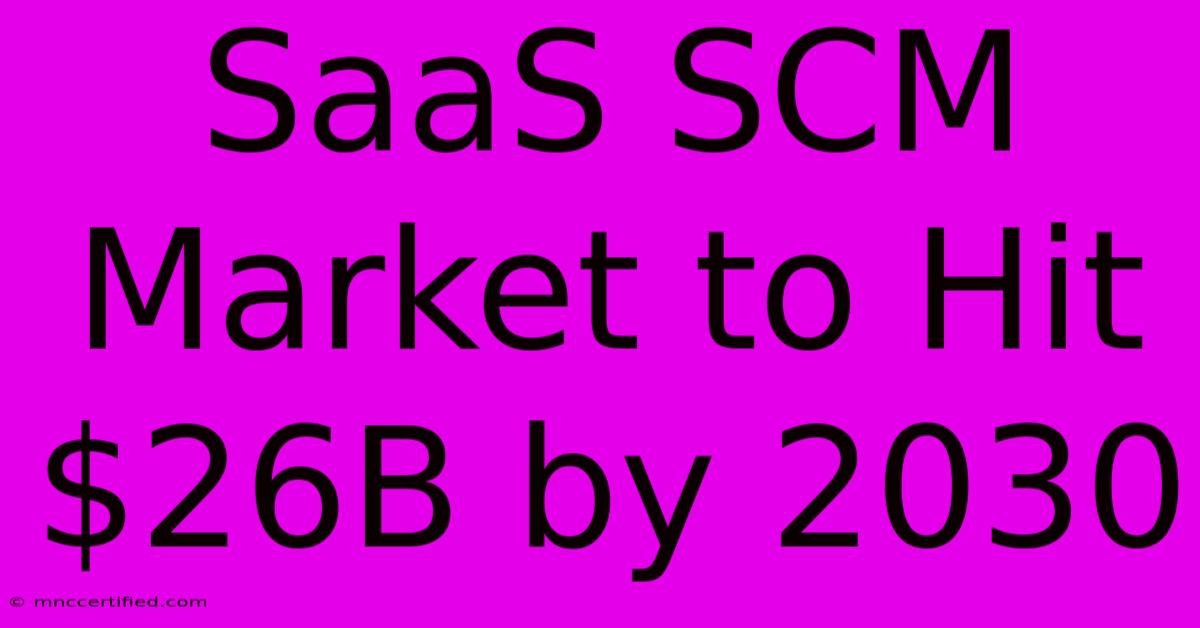SaaS SCM Market To Hit $26B By 2030

Table of Contents
SaaS SCM Market to Hit $26B by 2030: A Deep Dive into Explosive Growth
The Software as a Service (SaaS) Supply Chain Management (SCM) market is experiencing explosive growth, projected to reach a staggering $26 billion by 2030. This isn't just a prediction; it's a reflection of significant shifts in business operations, technological advancements, and evolving customer expectations. This article will delve into the key drivers behind this phenomenal growth, explore the market landscape, and discuss the opportunities and challenges that lie ahead.
The Driving Forces Behind SaaS SCM's Ascent
Several factors contribute to the robust growth of the SaaS SCM market:
1. The Cloud's Irresistible Appeal:
The shift to cloud-based solutions is a primary catalyst. SaaS SCM offers scalability, flexibility, and cost-effectiveness compared to traditional on-premise systems. Businesses, especially SMEs, appreciate the reduced upfront investment, lower IT maintenance costs, and easier access to advanced functionalities. This accessibility is democratizing SCM capabilities, extending them to businesses previously unable to afford sophisticated systems.
2. Enhanced Visibility and Collaboration:
SaaS SCM platforms provide real-time visibility across the entire supply chain. This enhanced transparency enables better collaboration between stakeholders – manufacturers, suppliers, distributors, and retailers – leading to improved efficiency and reduced lead times. Improved communication and data sharing are crucial competitive advantages in today's dynamic market.
3. Data-Driven Decision Making:
Modern SaaS SCM solutions leverage big data analytics to provide actionable insights. Businesses can analyze historical data, predict future trends, and optimize their supply chains for maximum efficiency and profitability. This data-driven approach minimizes risks, improves forecasting accuracy, and strengthens overall resilience.
4. Integration with Other Business Systems:
Seamless integration with Enterprise Resource Planning (ERP) systems, Customer Relationship Management (CRM) systems, and other business applications is crucial for holistic business management. SaaS SCM platforms are increasingly designed for easy integration, fostering a streamlined and unified operational flow.
5. Rising Demand for Supply Chain Resilience:
Recent global events, such as the pandemic and geopolitical instability, have highlighted the critical need for resilient supply chains. SaaS SCM solutions empower businesses to better manage risks, adapt to disruptions, and maintain business continuity. Features such as inventory optimization, risk mitigation tools, and alternative sourcing strategies are in high demand.
Market Landscape and Key Players
The SaaS SCM market is populated by a diverse range of vendors, from established giants to innovative startups. These players offer a variety of solutions catering to specific industry needs and business sizes. Some key players include (but are not limited to):
- Oracle: Known for its comprehensive suite of enterprise solutions, including robust SCM offerings.
- SAP: Another major player with a wide array of SCM tools integrated into its ERP ecosystem.
- Infor: Offers industry-specific SaaS SCM solutions tailored to various sectors.
- Blue Yonder: A leading provider of AI-powered supply chain solutions.
- Manhattan Associates: Specializes in warehouse management and supply chain optimization.
Opportunities and Challenges Ahead
While the future looks bright for the SaaS SCM market, several challenges remain:
- Data Security and Privacy: Protecting sensitive supply chain data is paramount. Robust security measures are crucial to maintaining customer trust and complying with regulations.
- Integration Complexity: Integrating SaaS SCM with existing legacy systems can be complex and require significant effort.
- Talent Acquisition and Training: Finding and retaining skilled professionals to manage and utilize these advanced systems is a growing concern.
Despite these challenges, the opportunities are immense. The continued adoption of cloud technologies, the increasing demand for supply chain visibility and resilience, and the ongoing development of innovative solutions will continue to fuel the growth of this dynamic market. The $26 billion projection by 2030 is not merely a possibility; it's a highly probable outcome given the current trajectory.
Conclusion: Embracing the SaaS SCM Revolution
The SaaS SCM market's explosive growth signifies a fundamental shift in how businesses manage their supply chains. Embracing these cloud-based solutions is no longer a luxury; it's a necessity for businesses seeking to thrive in an increasingly complex and competitive global landscape. By leveraging the power of data, collaboration, and automation, businesses can unlock significant efficiencies, improve profitability, and build more resilient and adaptable supply chains. The future of SCM is undeniably SaaS-powered, and the projected $26 billion market size by 2030 reflects this inevitable transformation.

Thank you for visiting our website wich cover about SaaS SCM Market To Hit $26B By 2030. We hope the information provided has been useful to you. Feel free to contact us if you have any questions or need further assistance. See you next time and dont miss to bookmark.
Featured Posts
-
Ecosystem Word Search Puzzle
Nov 30, 2024
-
Rupert Grints 1 8m Tax Dispute Ends
Nov 30, 2024
-
Culpo Mahomes Nfl Black Friday Merch
Nov 30, 2024
-
Sonic 2 For 7 Deal End Date
Nov 30, 2024
-
Jeanty Boise State Shirtless Warm Up Surprise
Nov 30, 2024